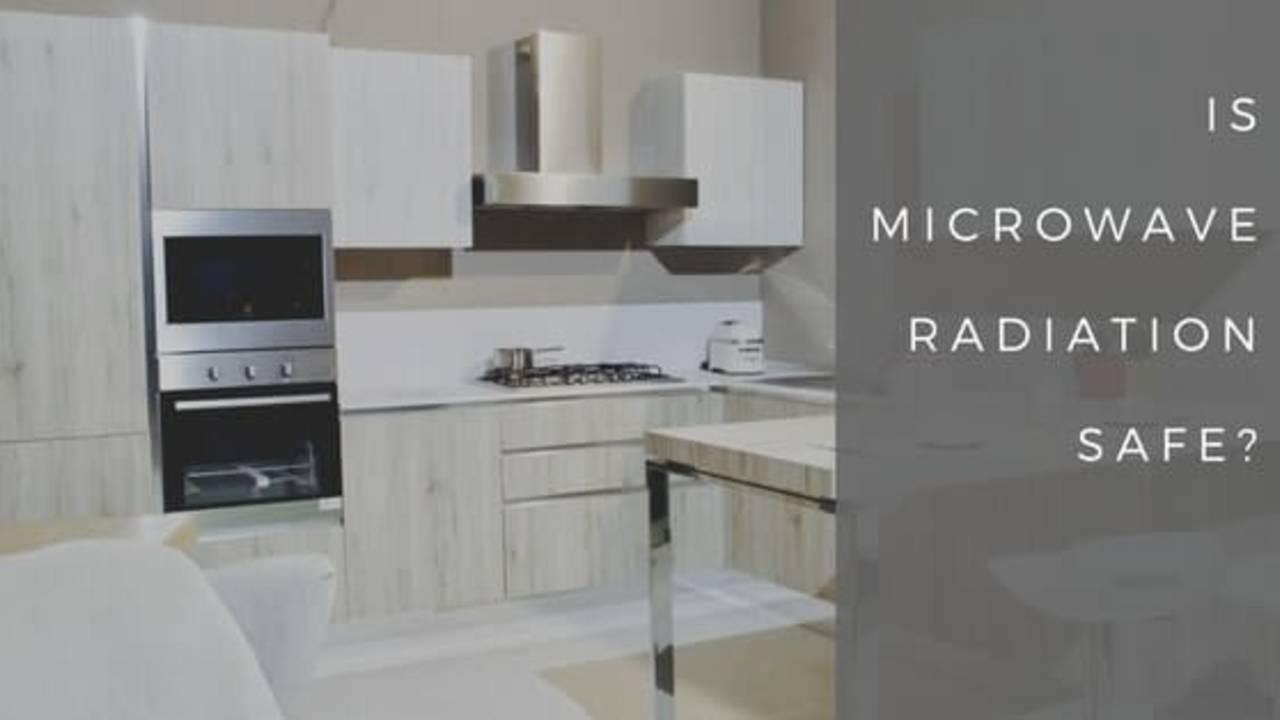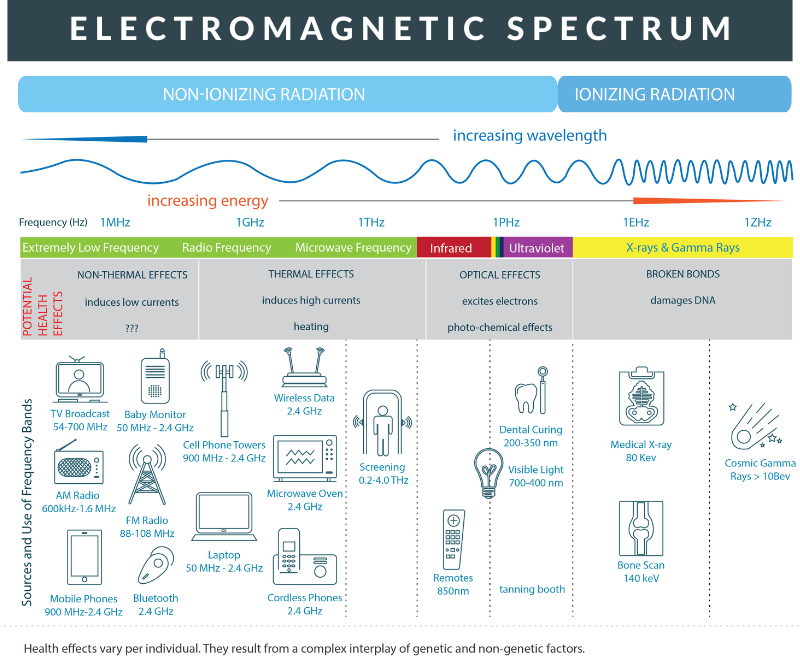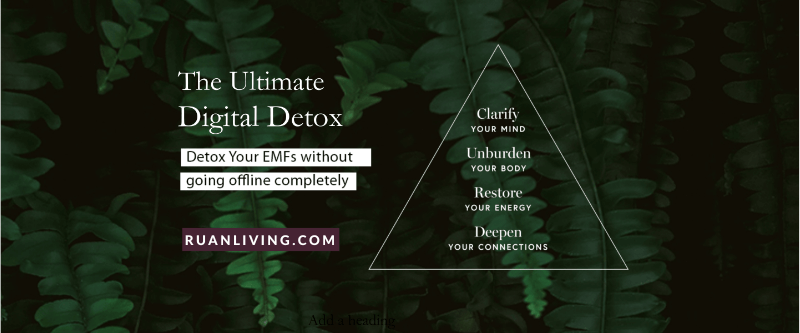
The Dangers of Microwave Radiation and How To Reduce Exposure
Jan 28, 2023Updated by Sophia Ruan Gushée
As someone who has been sensitive to electromagnetic fields (EMFs), I have often wondered, What are common sources of exposure to microwave radiation including the safety of microwave ovens? Is microwave radiation harmful? What are the effects of microwave radiation—not only in terms of radiation emitted from microwave ovens but also in terms of how microwave radiation may alter the food that they cook?
This article describes common sources of exposure (or overexposure) to microwave radiation, and tips on how to protect yourself from microwave radiation
What is microwave radiation?
Considered a type of non-ionizing radiation, microwave radiation is a class of radio waves that have frequencies ranging from 3000 waves per second (3 kHz) to 300 billion waves per second (300 GHz). The NASA video below explains microwave radiation not only in our homes but also in nature and how it’s used in science.
What are common sources of exposure to microwave radiation?
Microwave ovens are among the common sources of exposure to microwave radiation. Other microwave sources of radiation include cell phones, televisions, radios, baby monitors, cordless phones, and other sources of WiFi and Bluetooth radiation. These devices emit very low levels of microwave radiation. Microwaves sources of radiation are many however.
The image below illustrates energy (aka, radiation), including microwave radiation, along an electromagnetic radiation spectrum. Take a look because you can also see what are common sources of microwave radiation within a home. There are countless sources of microwave radiation from what we buy, own, and do. Becoming aware of common sources of exposure to microwave radiation will help inform you on how to avoid microwave radiation.

What do the studies reveal about the effects of microwave radiation?
Our everyday microwave radiation exposure—which is long-term, chronic exposure to low levels of microwave radiation—has been studied a lot. But more research is needed since our daily exposures changes dramatically each year.
Remember that the iPhone was released in just 2007. Since then, there's been a big bang of "smart," wireless products, including kitchen and other household appliances. So, we simply have not had enough time and data to study the potential threats to human health and development from our constantly evolving EMF exposure. But, this area has attracted a lot of studies because some scientists are concerned about the findings so far.
Becoming aware of what we do know is an important first step toward gaining practical wisdom. In this article, we focus on the most common appliance that emits microwave radiation: microwave ovens. But, first, let's discuss whether microwave radiation is harmful.
The answer to the question of, Is microwave radiation harmful based on the current body of peer-reviewed science? depends on which set of experts you ask. In my opinion, the most informed experts believe that we need to take precautionary measures, especially for the youngest of us.
To understand the long-term effects of an average person's exposure to microwave radiation, generations of exposed people need to be studied. The timing of our microwave radiation exposure matters because humans are uniquely vulnerable during our prenatal development, infancy, early childhood, and adolescence.
Examples of a few types of health effects from microwave radiation include:
- Impaired eye health. According to the Food and Drug Administration (FDA), our eyes are one of the most vulnerable. (Testes are highly vulnerable too.) Unlike other areas of the body, they lack the blood vessels to dissipate the heat and cellular stress caused by radiation exposure. Cataracts have been reported in those frequently exposed to high levels of x-ray radiation. It’ll take many decades to begin to understand the long-term effects of unprecedented hours staring at a digital screen from childhood.
- Microwaves and Alzheimer's disease. A 2016 study in Experimental and Therapeutic Medicine revealed that long-term microwave radiation exposure increases your risk of impaired brain function and can affect our central nervous system (CNS) causing neurodegenerative diseases such as Alzheimer's (the most common form of dementia), cancer, and infertility.
- Effects of microwave radiation on brain energy metabolism and related mechanisms. Another study found that overexposure to microwave radiation caused headaches, fatigue, memory loss, impaired learning, brain damage, and dysfunction.
- Effects of fetal microwave radiation exposure on offspring behavior in mice. This study on mice found that the effects of fetal microwave radiation exposure varied by the mice's gender.
- Long-term exposure to microwave radiation provokes cancer growth: evidences from radars and mobile communication systems. This 2011 report concludes that low levels of microwave radiation exposure can induce cancer growth in humans and animal studies under certain conditions.
So, what are the effects of microwave radiation on human health and development? Some studies find it to be a contributing factor to various adverse health outcomes like cancer, Alzheimer's Disease, cognitive impairment, and more. Effects are most likely influenced by the duration, frequency, and timing of (which stage of human development the subject experienced the aforementioned) microwave radiation exposure.
Are microwave ovens safe?
So, let's return to microwave radiation from microwave ovens.
Some of the most credible organizations including the American Cancer Society, National Cancer Institute, World Health Organization, and the FDA agree that microwave ovens do not pose a risk to our health when used properly. And a minority of experts warn that microwave ovens are not safe.
One important thing you should do is assess whether your microwave meets the most recent regulations and that you’re using it properly.
How to avoid radiation exposure from your microwave oven
While most experts believe that microwave ovens are safe when used properly, improper use can be unhealthy. The most common misuse of microwave ovens is because they are somehow damaged or otherwise faulty. This may include:
- Being unable to close the microwave door properly
- A gap, loose seal, or hinge
- Being unable to turn the microwave off after opening the door
Radiation injuries can happen from radiation leaking through gaps in microwave oven seals. If you notice any of the above, stop using the microwave immediately. But, keep in mind that “FDA regulations require that microwave ovens are designed to prevent these high-level radiation leaks. In fact, manufacturers must certify that their microwave ovens comply with specific FDA safety standards. These standards require any radiation given off by ovens to be well below the level known to cause injury.”
Consult with your healthcare provider if you’re concerned about someone with an electronic cardiac pacemaker.
How to protect yourself from microwave radiation emitted from microwave ovens
In addition to following the manufacturer’s instructions and ensuring that your microwave oven is not faulty, the tips below are precautionary measures you can take to further reduce your microwave radiation exposure.
- Never open the microwave oven door while the microwave oven is on.
- Don’t use microwave ovens that continue to operate when the microwave oven door is open.
- Be careful of burning yourself from very hot microwaved food. Injuries have occurred from certain overly cooked food or liquids.
- Leave the room while the microwave is in use
- Avoid use when you have children around
- Test your microwave for leaks – you can do this simply by placing your cell phone in the microwave, calling from another phone, and seeing if the signal goes through. Although they emit different frequencies, the microwave oven should block them.
Microwaving food: good or bad?
As is often the case in the science of the health risks from toxic exposure, there is no consensus on whether microwaving food deteriorates its nutritional quality. However, as can be seen from select examples in the table below, most reports express the opinion that microwaving food does not significantly decrease nutritional value more than other forms of cooking. For example, the World Health Organization (2005) states that “Food cooked in a microwave oven is as safe, and has the same nutrient value, as food cooked in a conventional oven.”
A minority claim that it denatures nutrients, like proteins in breast milk (it's recommended that you NOT use the microwave for breast milk).
As a practical nontoxic lifestyle expert, I know that microwaving food or liquids in plastics and other packaging materials can contaminate your food with toxic chemicals. For example, hormone disruptors (like BPA and phthalates) can be released from food packaging, when heated, into your food. So be thoughtful about in what materials you microwave food and liquids. The few times I use a microwave, I place food in microwave-safe glass containers.
| MICROWAVING FOOD IS HARMLESS | MICROWAVING FOOD IS HARMFUL |
|---|---|
| World Health Organization (2005) | Chicago Tribune (1992) |
| Harvard Health Letter (2019) | |
| McGill Office For Science and Society (2017) |
Conclusion
With advances in technology, we are exposed to unparalleled levels of microwave radiation from household products. Common sources of exposure to microwave radiation include microwave ovens, cell phones, televisions, radios, laptops, and kitchen and other appliances that have WiFi and Bluetooth technology.
Microwave oven radiation has been a concern for a long time. However, microwave oven radiation is generally considered safe when using a microwave oven that meets FDA requirements and according to the manufacturer's instructions. The additional precautionary tips above offer added protection.
To learn more about how to prevent microwave radiation exposure through practical changes, check out our related articles:
- What Are EMFs?
- EMF Danger Levels of Home Appliances
- Effects of EMFs on Your Health
- WiFi Radiation: How Concerned Should You Be?
- The Effects of X-Rays on Early Pregnancy
Ruan Living Resources
There are many free or low-cost things you can do to reduce EMF exposure at home. I organized what I wish I knew sooner in my online EMF Detox at the D-Tox Academy. Learn more here: D-Tox Academy by Ruan.
—
About Sophia Ruan Gushée
Sophia Ruan Gushée is a preeminent nontoxic lifestyle expert, author of the critically acclaimed books A to Z of D-Toxing and EMF Detox Workbook, creator of D-Tox Academy and 40-Day Home Detox, and host of the Practical Nontoxic Living podcast.
She has helped thousands of people eliminate harmful—often hidden—chemicals, heavy metals, and electromagnetic fields from their homes and lifestyles. Based on more than 15 years of tracking the latest research, she believes that removing these toxins is the overlooked key to unlocking greater mindfulness, mental clarity, emotional harmony, and physical healing.
Sophia also works with companies and served on the prestigious Brown University School of Public Health Advisory Council and the exclusive Well+Good Council. She has appeared or been featured on the most popular health and wellness platforms including The Doctor Oz Show, Health magazine, Family Circle magazine, MindBodyGreen, and much more. You can learn more about Sophia by clicking here: Sophia Ruan Gushée.
Stay connected with nontoxic lifestyle news and updates!
Receive our free Ruan Living Nontoxic Cleaning Guide when you join our email list.
Don't worry, your information will not be shared.
We hate SPAM. We will never sell your information, for any reason.








